
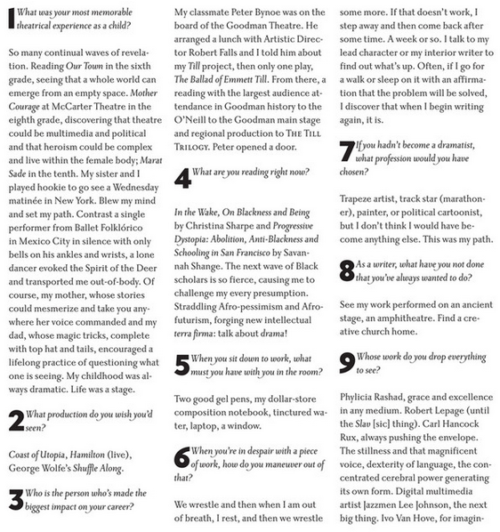
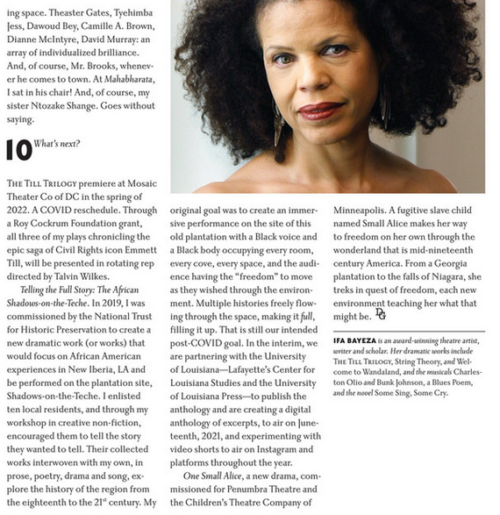
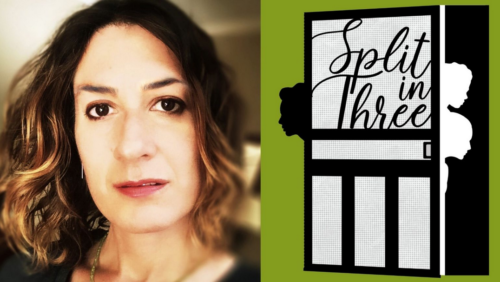
Stephanie Vickers interviewed playwright Daryl Lisa Fazio ahead of TVAA’s upcoming production of Fazio’s play Split in Three. Vickers, the Arts Integration Program Director at TVAA, is directing the local production of the play.
Split in Three will be performed May 15, 16, 22, & 23, 2021 at 2 pm on The Commons in Tuscumbia, AL. Get Tickets
Read the full interview at theTennessee Valley Art Association here.
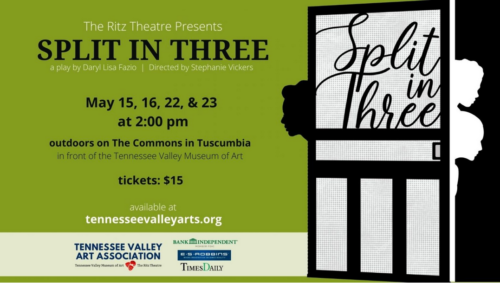
Created by 26 artist-collaborators, Swell weaves together ten original, new music compositions by ten composers.

Playwright, lyricist, and librettist Melisa Tien is the creator and producer of the upcoming live, online song cycle Swell, presented by HERE from March 17-21, 2021. This contemporary work about immigrants and children of immigrants, written by immigrants and children of immigrants, is directed by Elena Araoz with music direction by Tian Hui Ng.
“Right now, the U.S. feels like it’s on the brink of so many things – politically, economically, socially. Immigrant stories, especially ones that humanize the people they’re about, help highlight those who are often left behind when, for example, a medical disaster happens. Swell reminds us these are real people, simply trying to make their way, like everyone else,” Melisa said of the piece’s subject and timeliness.
Swell features the work of composers and lyricists Joshua Cerdenia, Carolyn Chen, Justine F. Chen, Or Matias, Tamar Muskal, Polina Nazaykinskaya, Leyna Marika Papach, Izzi Ramkisson, Kamala Sankaram, Jorge Sosa, Stavit Allweis, Konstantin Soukhovetski, and Melisa Tien, who draw from their personal histories and cultures. Hailing from Mexico, India, Israel, Japan, Trinidad, the Philippines, Russia, and Taiwan, the composers’ unique, surprising, and deeply human stories are expressed through voice, piano, cello, and violin.
Performers include mezzo-soprano Hai-Ting Chinn, soprano Mimi Hilaire, tenor Alok Kumar, and baritone Ricardo Rivera. Instrumentalists include members of the Victory Players Nathan Ben-Yehuda, Clare Monfredo, and Elly Toyoda. Additional collaborators are Video Designer Jeanette Oi-Suk Yew, Audio Engineer Jon Robertson, Video Engineer Kris Kirkwood, Production Stage Manager Neelam Vaswani, and Assistant Stage Manager Alyssa K. Howard.

As an online presentation, Swell is building upon the wealth of knowledge that has accumulated over the past year in live, online productions. It will feature singers singing together remotely, and aims to incorporate accessibility for the deaf and hard-of-hearing, through captioning, an interpreter, and a new application that conveys music in a dynamic visual format.
Melisa summarizes the origins of the piece: “The seed for Swell started when I attended a new music festival a few years ago and was struck by a piece of Nathalie Joachim’s. It was tied to her home country of Haiti and I recall being so moved by it, partly because it put me in mind of Taiwan, where my own family is from. I started to wonder where the other U.S.-based new music writers were, who came from outside the U.S. I couldn’t think of any, yet I was convinced there had to be new music writers out there who identified as immigrants, or children of immigrants, who had stories to tell, and I wanted to hear them.”
Half of the program will be presented on Wednesday, March 17 at 8pm ET, and the second half will be presented on Thursday, March 18 at 8pm ET. The full program will stream on Friday and Saturday, March 19-20, at 8pm ET, and on Sunday, March 21 at 6pm ET. Audiences can purchase a sliding-scale ticket ($5-50) and will receive details for a password-protected video on HERE’s website.
Melisa Tien is a playwright, lyricist, librettist, producer, and educator. She is the author of the plays Untitled Landscape, Best Life, The Boyd Show, Yellow Card Red Card, and Familium Vulgare, co-author of the music-theater works Swell, Daylight Saving, and Mary, and co-producer of the audio experience/podcast Active Listening. A New Dramatists resident playwright, Melisa is a recipient of a grant from the NYC Women’s Fund for Media, Music, and Theatre, a commissionee of the Ensemble Studio Theatre/Sloan Project, and a New York Foundation for the Arts Fellow in Playwriting/Screenwriting. She teaches experimental theatrical writing at Sarah Lawrence College. BA, UCLA; MFA, Columbia University. www.melisatien.com.
Read the full article from Broadway World here.

In spite of all the theater-related traveling I did in the years before the pandemic struck, there are still plenty of drama companies of consequence that I have yet to see. I’ve been hearing good things about Arkansas’s TheatreSquared for some time now, and it was long my plan to see a play there after paying a visit to the Crystal Bridges Museum of American Art, which is just 30 miles away and which I also have yet to see. But life kept getting in the way, and the coming of Covid-19 finished the job: I haven’t seen a play in a theater, in or out of New York, since March. So when TheatreSquared announced that it would be webcasting a production of Lauren Gunderson’s “The Half-Life of Marie Curie” taped in an empty theater, I immediately put it on my schedule.
Ms. Gunderson’s work is rarely staged in New York, but she was the most frequently produced playwright in America (not counting Shakespeare) in 2017 and 2019, and it’s easy to see why. Not only does she specialize in feminist-angled plots whose protagonists are women, but she makes a special point of writing eminently practical plays that are carefully tailored to the specific needs of theater companies. Like all prolific artists, Ms. Gunderson’s work is uneven—she can be earnest to a fault when she has a political point to make— but at her best, she is a fine craftsman whose shows are always solidly made and on occasion inspired.
“The Half-Life of Marie Curie,” a two-hander first performed off Broadway in 2019, falls somewhere in between the extremes of over-earnestness and inspiration. It’s a bioplay that tells how Mme. Curie (Rebecca Harris)—the Polish-French physicist who discovered radium, coined the word “radioactive” and won two Nobel Prizes, in 1903 and 1911—was persecuted by France’s press when it became known that she was having a passionate affair with a married man. Hertha Ayrton (Leontyne Mbele-Mbong), a British colleague and part-time suffragette, comes to France to look after her old friend as the action gets under way. Alas, much of the dialogue that ensues amounts to little more than undramatized pulpit-pounding and ill-digested biographical data (“I’m sorry—you won another Nobel Prize?”) with a few glaring anachronisms thrown in for good measure (I cannot imagine that a Brit with so well-bred an accent would have used the word “bullshit” in casual conversation in 1911). Nevertheless, the situation portrayed by Ms. Gunderson has the advantage of being inherently dramatic, and “The Half-Life of Marie Curie” is the kind of story that can easily take wing so long as the two actors are first-rate.
This brings us to Ms. Harris and Ms. Mbele Mbong, both of whom (as theater people like to say) really know how to deliver the mail. Not only does Ms. Harris bear a striking resemblance to Mme. Curie, but her binational accent is impeccable and her performance is both compelling and entirely believable. So fully does she embody her role that it hardly seems as if she’s acting at all. (Newsreel footage of Mme. Curie exists, and I’d be surprised if Ms. Harris hadn’t screened it while preparing for this show.)
Ms. Mbele-Mbong is no less convincing, and the production, whose skeletal sets are by Ashleigh Burns and whose sound design is by Michael Prie to, is spare but exceedingly handsome. Dawn Monique Williams, the director, is the associate artistic director of Berkeley’s Aurora Theatre Company. Her work is new to me, but if this beautifully staged show is representative, then I’ll definitely seek it out in the future.
I also plan to keep an eye on TheatreSquared, which is clearly worthy of its fine reputation. I can’t wait for the pandemic to subside so that I can resume seeking out first-class theater all over America—especially from outstanding drama companies like TheatreSquared.
Review by Terry Teachout for the Wall Street Journal.
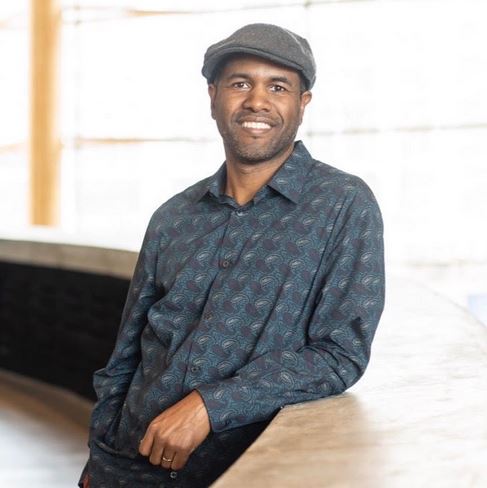
Before he began hosting Psalm’s Salons for Studio Theatre, playwright and director Psalmayene 24 didn’t yearn to interview fellow artists in public — with or without his preferred soft drink (ginger beer) in hand.
“I had zero desire to do this,” the busy local theater-maker confesses, recalling his path to emceeing the monthly virtual event, which he describes as “a cultural space that celebrates excellence, unity and the spirit of joy through an unapologetically Black lens.” The latest installment streams Sept. 18 at 5 p.m. with a trio of high-profile guests: Will Power, Danny Hoch, and Jonzi D, pioneers of hip-hop theater.
If Psalm (as he’s known to colleagues) acquired his new gig by default — answering “an opportunity and a need,” he says — he has come to relish it, and has arguably reinvented the online theater-chat format along the way. Free, and streamed live on Studio’s Facebook and YouTube pages, the salons have featured such guests as playwright James Ijames, actors Natalie Graves Tucker and Justin Weaks, and playwright-performer Lady Dane Figueroa Edidi. Conversations cover substantive and urgent issues — from the interviewees’ artistic processes and philosophies; to systemic racism in America; ongoing activism for social justice; the death of Rep. John Lewis; and recent calls for the American theater field to acknowledge and rectify its own racism.AD
But while the discussions tend overall toward seriousness, the salons often boast an upbeat, even celebratory vibe. D.C.-based DJ Nick “tha 1da” Hernandez spins original live music. Participants regularly exchange toasts during a “Mental Health Drink Break,” allowing Psalmayene 24 to indulge in the aforementioned ginger beer, and everyone else to swig beverages of choice. Shout-outs to Black-owned restaurants — host, DJ and guests dish about dishes they have ordered that day — add a sense of community, even as participants zoom in from shelter-in-place locations.
Speaking by phone from Silver Spring — “Piscataway land,” he stresses, acknowledging the Indigenous residents — Psalmayene 24 says there’s no contradiction between the salons’ buoyancy and intense content. The episodes mirror life, he observes, “where you have comedy and tragedy. It’s like the iconic mask of theater.” He adds, “Black people in this country — we have dealt with a lot of pain.” But to find meaning in life, he notes, “You have to find joy. You have to find laughter.” Indeed, he says, “Joy is part of how we fight.”
Psalm’s Salons launched in June, three months after covid-19 forced Studio to suspend performances of Antoinette Nwandu’s play “Pass Over,” which Psalmayene 24 had directed. The pandemic also affected a planned outreach series, aimed at deepening Studio’s connections with Black millennial audiences. On board as host, Psalmayene 24 envisaged conversations fused with music, with touches of dance party.
When the series had to move online, he drew inspiration from the popular “Verzuz” Instagram musical battles launched early in the pandemic by superproducers Timbaland and Swizz Beatz. “Two hip-hop artists who are re-creating how people commune — I thought that was fascinating,” Psalmayene 24 says. He’s a hip-hop-theater eminence himself; he even wove hip-hop touches into “Les Deux Noirs,” his play about Richard Wright and James Baldwin, staged last year by Mosaic Theater Company. The “Top Five” feature in Psalm’s Salons, in which guests name favorite theater works, nods to a hip-hop tradition of ranking rappers, he says.
For tunes, he turned to Hernandez — a frequent collaborator, who had designed sound for Theater Alliance’s “Word Becomes Flesh,” winner of five 2017 Helen Hayes Awards, including for Psalmayene 24’s direction. Mixing his own material with audio from the Library of Congress’s Citizen DJ tool, Hernandez creates the salons’ introductory and incidental music, catchy enough that participants can be seen nodding to the beat.AD
The music adds palpable energy and a sense of “exciting connection,” notes Studio associate artistic director Reginald L. Douglas. “Having Nick is such a boon,” he says.
Hernandez also creates a Spotify playlist for each episode. There’s space for uplift, even alongside weighty talk about societal issues, he thinks, especially because the current moment of national reckoning could lead to a better future. “A lot of times people associate change with being in turmoil, where it should be more about a blooming process,” Hernandez says.
When it comes to guests, Psalmayene 24 says the aim is to recruit people who can speak “eloquently about their art, but also can speak to the times.” (At next month’s salon, on Oct. 22 at 5 p.m., Mildred Ruiz-Sapp and Steven Sapp, of the Universes theater company, will fit that bill. The salons will run at least through November.) The key to interviewing, Psalmayene 24 has found, is not only the preparatory research he loves to do, but a willingness — as with good acting — to listen and “relax in the moment, love the moment.”AD
So, while the covid-19 era finds the 47-year-old busier than ever — among other projects, he has contributed to Arena Stage’s in-house film series and Round House Theatre’s Web series “Homebound” — he has time for the “high wire” of hosting.
Salons are, in their way, an artistic genre. “To experiment and explore form as an artist — that’s something deeply important to me,” Psalmayene 24 says.
Where to watch
Studio Theatre’s Facebook and YouTube pages: facebook.com/the.studio.theatre and youtube.com/studiotheatredc.
Dates: Friday at 5 p.m.
Admission: Free.
Read the full article by Celia Wren from the Washington Post here.